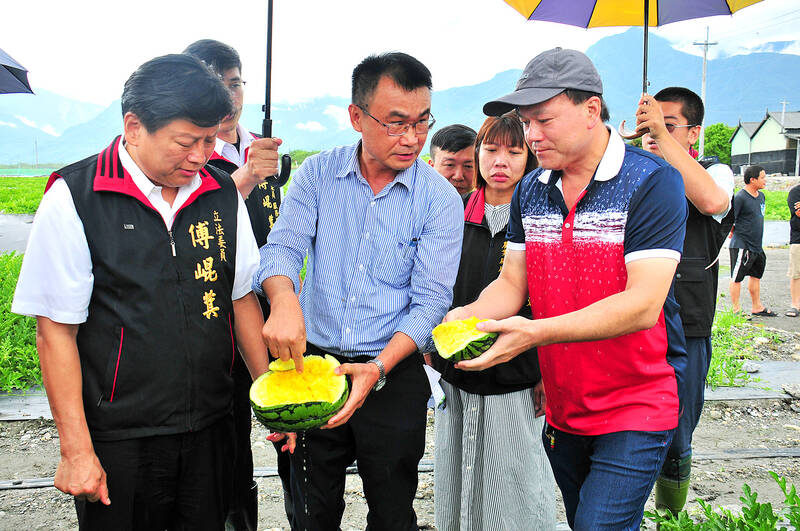The heads of two new ministries, the Ministry of Agriculture and the Ministry of the Environment, have been selected and are to take office when they officially launch next month, Executive Yuan spokesman Lin Tze-luen (林子倫) said yesterday.
Council of Agriculture Minister Chen Chi-chung (陳吉仲) is set to lead the agriculture ministry from its inauguration on Aug. 1, while National Chung Hsing University (NCHU) president Hsueh Fu-cheng (薛富盛) is to lead the environment ministry when it launches on Aug. 22.
Environmental Protection Administration Minister Chang Tzi-chin (張子敬) is not to assume the upgraded version of his post, as he believes he has achieved all he wanted to with the administration and has no intention of taking up the new post, Lin said.

Photo: Hua Meng-ching, Taipei Times
Instead, he is to become a minister without portfolio, he said.
Lin said that Hsueh’s credentials for the job include a doctorate in Materials Science and Engineering from Cornell University, alongside his previous positions such as heading NCHU’s College of Engineering and Office of Research and Development.
Hsueh has also served as a materials engineering convener for the National Science and Technology Council’s Department of Engineering and Technologies, Lin said.

Taiwan is stepping up plans to create self-sufficient supply chains for combat drones and increase foreign orders from the US to counter China’s numerical superiority, a defense official said on Saturday. Commenting on condition of anonymity, the official said the nation’s armed forces are in agreement with US Admiral Samuel Paparo’s assessment that Taiwan’s military must be prepared to turn the nation’s waters into a “hellscape” for the Chinese People’s Liberation Army (PLA). Paparo, the commander of the US Indo-Pacific Command, reiterated the concept during a Congressional hearing in Washington on Wednesday. He first coined the term in a security conference last

Prosecutors today declined to say who was questioned regarding alleged forgery on petitions to recall Democratic Progressive Party (DPP) legislators, after Chinese-language media earlier reported that members of the Chinese Nationalist Party (KMT) Youth League were brought in for questioning. The Ministry of Justice Investigation Bureau confirmed that two people had been questioned, but did not disclose any further information about the ongoing investigation. KMT Youth League members Lee Hsiao-liang (李孝亮) and Liu Szu-yin (劉思吟) — who are leading the effort to recall DPP caucus chief executive Rosalia Wu (吳思瑤) and Legislator Wu Pei-yi (吳沛憶) — both posted on Facebook saying: “I

The Ministry of Economic Affairs has fined Taobao NT$1.2 million (US$36,912) for advertisements that exceed its approved business scope, requiring the Chinese e-commerce platform to make corrections in the first half of this year or its license may be revoked. Lawmakers have called for stricter enforcement of Chinese e-commerce platforms and measures to prevent China from laundering its goods through Taiwan in response to US President Donald Trump’s heavy tariffs on China. The Legislative Yuan’s Finance Committee met today to discuss policies to prevent China from dumping goods in Taiwan, inviting government agencies to report. Democratic Progressive Party Legislator Kuo Kuo-wen (郭國文) said

Sung Chien-liang (宋建樑), who led efforts to recall Democratic Progressive Party (DPP) Legislator Lee Kun-cheng (李坤城), was released on bail of NT$80,000 today amid outcry over his decision to wear a Nazi armband to questioning the night before. Sung arrived at the New Taipei District Prosecutors’ Office for questioning in a recall petition forgery case last night wearing a red armband bearing a swastika, carrying a copy of Adolf Hitler’s Mein Kampf and giving a Nazi salute. Sung left the building at 1:15am without the armband and covering the book with his coat. Lee said today that this is a serious